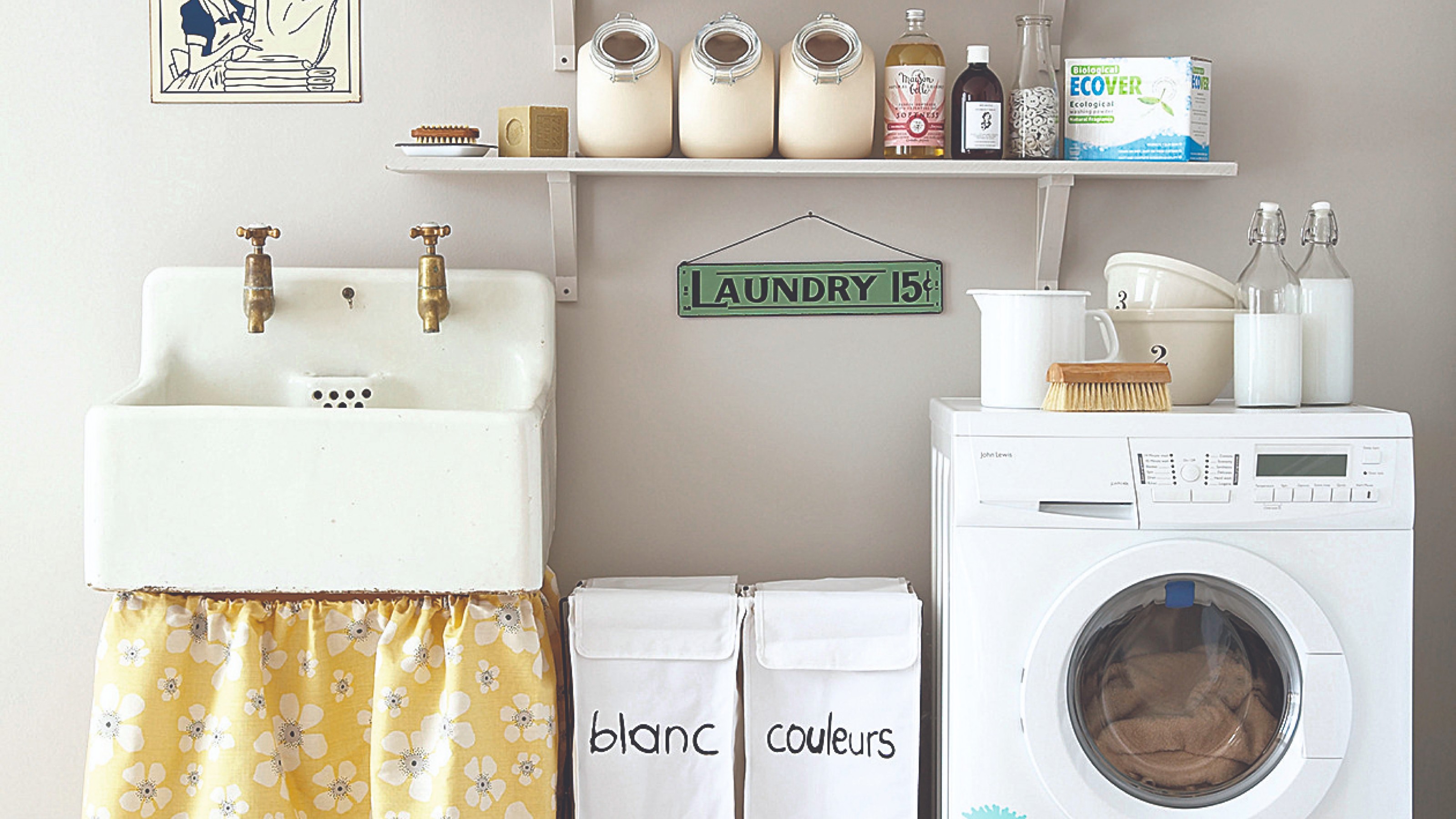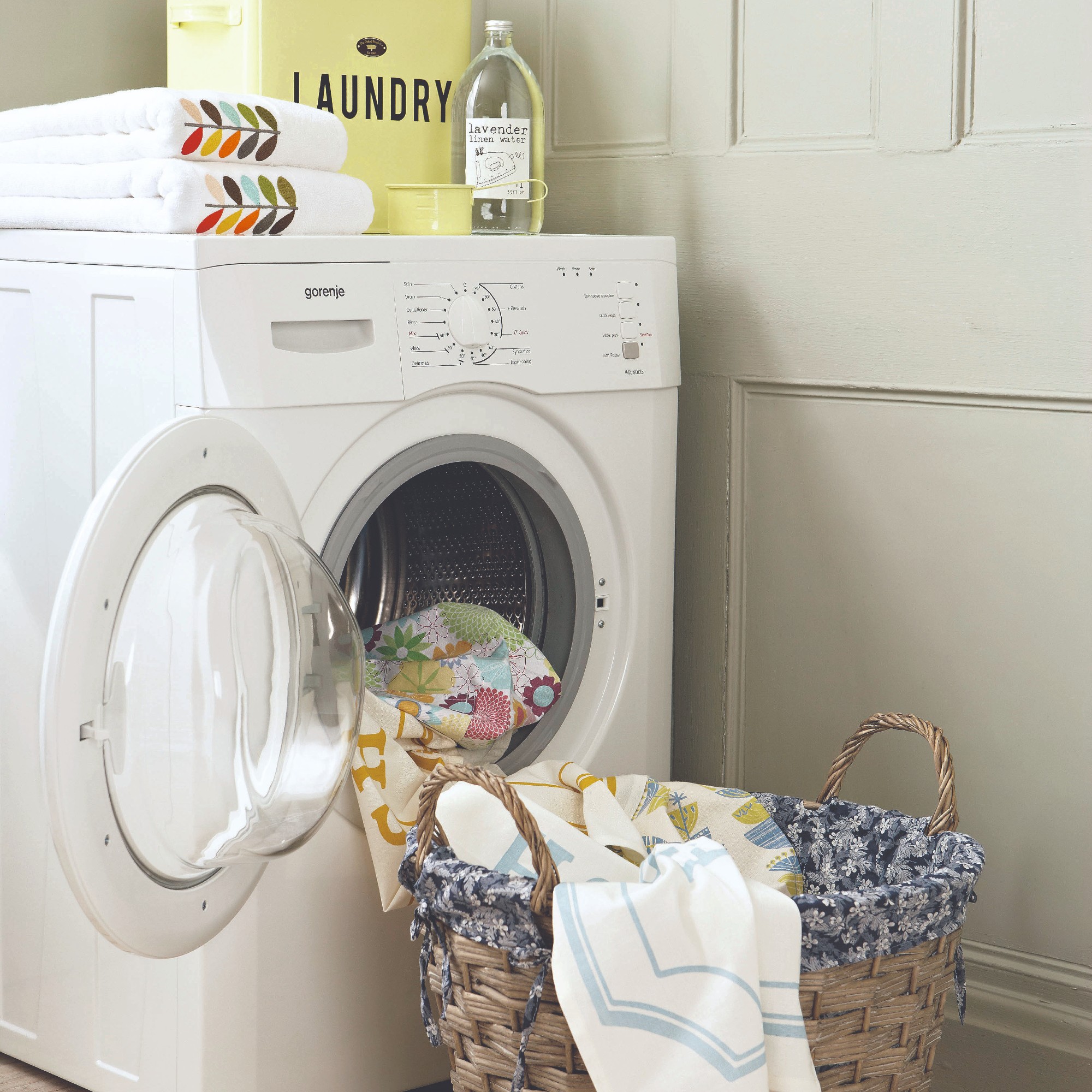How to stop your washing machine from smelling with a few easy steps
The expert-approved guide to eradicate bad washing machine smells


Ellis Cochrane
Knowing how to stop a washing machine from smelling is a worthwhile skill that will protect your clothes and keep your washing machine in good condition. Whether it’s down to a clogged filter or mould, let's face it, a smelly washing machine is never a welcome occurrence.
Overall, learning how to clean a washing machine properly will be your best friend in the mission to keep your washing machine from smelling.
'Mould and mildew tend to build-up in warm and wet environments – your washing machine is a place this is likely to occur if it’s not cleaned regularly,’ warns Astonish's cleaning expert and Product Development Scientist, Olivia Young. ‘You might find unpleasant odours start to develop, which could reflect onto your clothing – far from the fresh scent you want.’
Mould and mildew are the top reasons for a bad-smelling washing machine so educating yourself on how to clean mould from a washing machine is worth looking into if the smell is getting more pungent by the day, but we've found an easy way to put a stop to bad smells immediately.
How to stop washing machine smelling
If a bad smell is already lingering in your washing machine, the experts have shared some of their top tips to eliminate it for good.

The easiest way to banish a bad smell is to use a washing machine cleaner like the Dr. Beckmann Service-it Washing Machine Cleaner from Amazon. ‘There are proprietary washing machine cleaners that can be used to ensure internal pipe work is kept free draining,’ advises Denise Hanson, commercial director at the British Institute of Cleaning Science (BICSc).
However, there are some natural alternative. ‘Alternatively putting 500g of table salt in the machine and then running a boil wash can also be an effective cleaning method – this is recommended if you have used the machine to carry out any home dying operations,' explains Denise.
Get the Ideal Home Newsletter
Sign up to our newsletter for style and decor inspiration, house makeovers, project advice and more.
Petya Holvich, Fantastic Service's domestic cleaning expert and supervisor, chimes in with more store cupboard suggestions, ‘Run an empty hot water cycle with a cup of white vinegar or baking soda to help to remove any built-up residue and bacteria. Make sure to also wipe down the drum, door gasket and detergent dispenser regularly, using a mild solution of water and vinegar or a specialised washing machine cleaner.’
‘Some washing machines have a filter that traps lint and debris so make sure to periodically clean it as well to ensure proper water drainage. Additionally, inspect and clean the drain hose to prevent clogs and water stagnation.’
How to prevent a washing machine smelling
If you're washing machine is still on the fresh side, you will certainly want to keep it that way. The best way to do this is to follow these top tips, and hopefully you won't find yourself learning how to remove mould from a washing machine any time soon.
1. Remove the finished load immediately
It’s easy to leave your freshly laundered clothes or towels in the washing machine for a few hours without even realising how quickly the time has passed. But you want to avoid doing this to keep your clothes and your washing machine smelling their best.
‘Once the washing is complete, remove the finished load immediately, transferring it to the dryer, or putting it to dry,’ Elliott Gee, Laundry Product Manager at Haier, Hoover and Candy says. ‘Leaving the laundry wet inside the washing machine can cause mould and mildew to fester.’
2. Leave the washing machine door ajar

You may already do this but if you’re not leaving your washing machine door open or ajar after you’ve removed your laundry, this can also lead to a musty odour.
‘Without proper air circulation, residual moisture inside the washer can't evaporate, leading to a buildup of odour-causing bacteria and mould,’ says Ava Wilson, Chief Editor At Unclutterer.
As well as keeping the door ajar, it’s also worthwhile leaving the detergent drawer open as well, to give it a chance to dry out between uses.
3. Dry the drum
It’s easy to forget to dry the washing machine drum after it’s finished a load of washing but giving it a quick wipe down after each use can remove excess moisture and prevent a musty or mouldy smell from materialising.
You may not have thought about the inner workings of a washing machine but the ‘machine's moist interior, particularly the rubber gasket and drum, encourages the growth of mildew,’ and mould, according to RGBDirect’s appliance expert Dennis Digwa. So, you want to ensure that it remains as dry as possible after each use.

4. Pay attention to the inside rubber door seal
Mould and mildew ‘commonly form around the rubber door seal,’ Ava affirms. This is because it often remains wet for many hours after you take your washing out of the machine.
‘The best way to clean this is with a damp cloth and disinfectant spray. Spray your product into the lip and then use our cloth to get into it and dig out any dirt that has built up,’ says Ian Palmer-Smith, appliance expert at Domestic & General.
5. Routinely clean the detergent drawer
‘The detergent we pour in the dispenser for the laundry is not always used completely by the washing machine,’ Elliott reveals. Because of this ‘the detergent that isn’t used remains encrusted in the drawer and transforms into mould.’
‘To effectively clean it and get rid of the bacteria, you can easily remove the drawer, then soak it for half an hour in hot water; to remove the mould from hard-to-reach corners you can use a toothbrush,’ Elliott explains.
Francesca Forgione, washing machine expert at AO.com, concurs. ‘Every couple of months, pull the detergent drawer out and with a toothbrush and hot, soapy water, scrub away any detergent or gunk build up. Then, leave it to air dry fully before putting it back in the machine.’

6. Don't overdo the laundry detergent and fabric softener
An ‘accumulation of soaps, detergents, fabric softeners, and clothing fibres in your washing machine isn't just a drain-clogging issue; it creates an ideal breeding ground for bacteria,’ Catherine Green says. So make sure you are sticking to the recommended dosage.
7. Do an empty run every month or so
A great way to keep your washing machine smelling its best is by running it without anything in it – this includes no detergent – every month or so.
‘The easiest way to clean out the drum of your washing machine is to run a maintenance wash cycle,’ Ian admits. ‘A maintenance wash is essentially a deep-clean cycle that helps to kill off any bacteria, mould, and any stains or sludge that has built up. This is carried out by performing a very hot ‘cotton’ wash coupled with some washing machine cleaning solution.’
Many washing machines also have a cleaning cycle of some sort. ‘This is a cycle that you can use that self-cleans the machine,’ Elliott explains. ‘Once every two months, do an empty load wash at 60°C.’
‘Regularly running an empty cycle with hot water and a specialised washing machine cleaner can also dissolve and wash away residues and bacteria,’ Ava outlines.
FAQs
How often should you be cleaning your washing machine?
Instead of having to dedicate a day to thoroughly cleaning your washing machine every few months, giving it a quick wipe down after each use and keeping the door ajar will help to keep your washing machine smelling pleasant for longer.
Why is it important to keep on top of cleaning your washing machine?
While ‘regular cleaning prevents the growth of mould and bacteria that cause unpleasant smells,’ a clean machine also ‘ensures optimal washing performance and efficiency,’ Dennis proffers.
Taking care of your washing machine can prolong and extend the life of the appliance as well. ‘A clean washer operates more efficiently, using less energy and completing cycles quickly,’ Ava clarifies. So, keeping your washing machine clean can have several different benefits.
Can hard water make your washing machine smell?
If you live in an area of the UK which has hard water, this could also contribute to a build up that gives off an unpleasant odour. This is ‘caused by the mineral accumulation from hard water,’ Dennis adds. So, you'll want to keep an eye on this.
Farewell bad washing machine smells!

Sara Hesikova has been a Content Editor at Ideal Home since June 2024, starting at the title as a News Writer in July 2023. She is now also the Ideal Home Certified Expert in Training on Furniture, and so far has tested 80 different sofas.
Graduating from London College of Fashion with a bachelor’s degree in fashion journalism in 2016, she got her start in niche fashion and lifestyle magazines like Glass and Alvar as a writer and editor before making the leap into interiors, working with the likes of 91 Magazine and copywriting for luxury bed linen brand Yves Delorme among others.
- Ellis CochraneContributor
-
 Wood drenching is the calming new twist on the colour drenching trend – here’s how to make the look work in your home
Wood drenching is the calming new twist on the colour drenching trend – here’s how to make the look work in your homeIt’s easier than ever to embrace natural materials
By Maddie Balcombe
-
 Aldi is launching a £200 day bed with four different features - its sleek design is suited to the whole family
Aldi is launching a £200 day bed with four different features - its sleek design is suited to the whole familyYou don't want to miss out on this Specialbuy
By Kezia Reynolds
-
 How to set up a drip watering system that saves water and a lot of effort
How to set up a drip watering system that saves water and a lot of effortKeep your plants hydrated (and your water bill down) with this clever garden watering solution
By Natalie Osborn